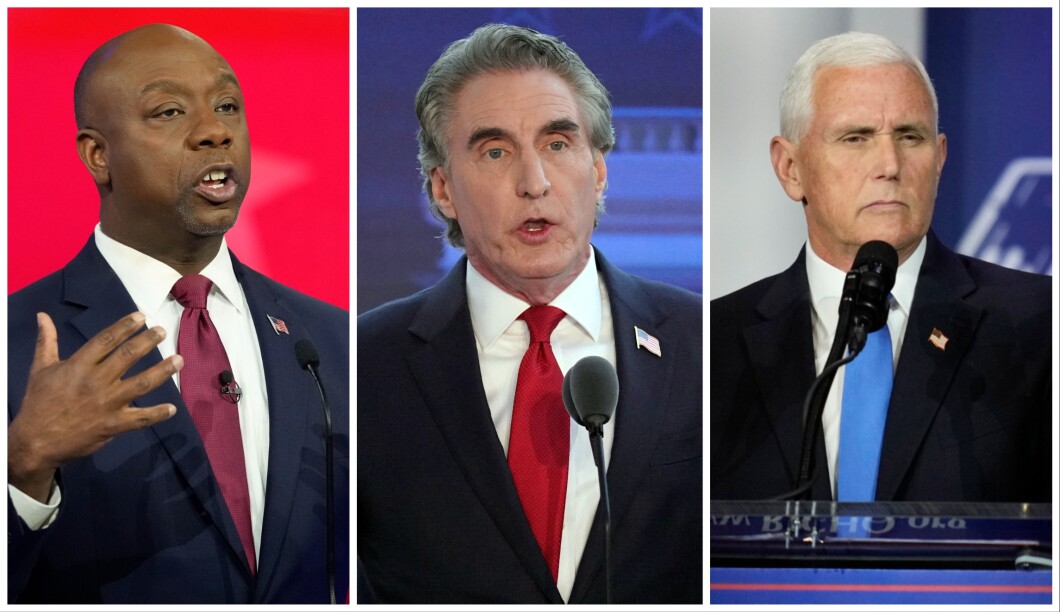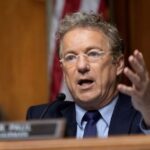
Several Republican campaigns for president both began and ended in 2023 as candidates failed to make traction among the crowded primary field or compete with former President Donald Trump’s massive polling lead.
Defying predictions, a large field of Republican presidential contenders emerged despite Trump’s effort to lock down the GOP nomination by default. By July, the New York Times-Siena College primary poll was tracking eight candidates, excluding other contenders who were polling below 1%.
NIKKI HALEY’S 2024 CAMPAIGN MOMENTUM UNDER NEW SPOTLIGHT IN IOWA CAUCUSES
At the time, the candidates being tracked included Trump, Gov. Ron DeSantis (R-FL), former U.N. Ambassador Nikki Haley, former biotech CEO Vivek Ramaswamy, former New Jersey Gov. Chris Christie, former Vice President Mike Pence, Sen. Tim Scott (R-SC), and Gov. Doug Burgum (R-ND). Other candidates, such as conservative radio host Larry Elder, former Texas GOP Rep. Will Hurd, and Miami Mayor Francis Suarez, also launched relatively short-lived presidential bids.

As debates began, the group slowly began to winnow, leaving just under half of the field in the running heading into 2024. Here are the contenders whose short-lived campaigns had ended by the close of 2023.
Mike Pence
After hinting at launching a presidential run for months, Pence entered the Republican race in June, touting himself as a tried and true conservative and relying on his strong Christian faith to appeal to evangelical Republican voters.
Pence often spoke at religious conferences such as those held by Faith and Freedom, Christians United for Israel, and the Family Research Council. He branded himself as a return to the fiscal conservatism and foreign policy deterrence of former President Ronald Reagan, with the belief that this brand of conservatism still prevailed in the Republican Party.
As his campaign continued, Pence specifically took aim at “populism,” which he claimed to be incompatible with conservatism.
But, in a Republican Party still dominated by his former running mate Trump, Pence was unable to escape the legacy of the 2020 election, the Jan. 6 Capitol riot, and his certification of the election results. Standing by his choice to certify the 2020 election results, cementing President Joe Biden’s victory over himself and Trump, Pence wasn’t successful in convincing Republicans to rally around him.
His unfavorability ratings, already high after his choices following the 2020 election, only seemed to grow during his campaign. He was also frequently met with taunts calling him a “traitor” from supporters of Trump.
By the end of October, he had achieved little movement in the field despite touting internal polls showing traction in Iowa. In a surprise move, the former vice president suspended his presidential campaign during a speech at the Republican Jewish Coalition conference.
“The Bible tells us that there’s a time for every purpose under heaven. Traveling across the country over the past six months, I came here to say it’s become clear to me that this is not my time. So after much prayer and deliberation, I have decided to suspend my campaign for president effective today,” he told the audience.
Tim Scott
Scott similarly spent time building suspense before launching his presidential campaign in June. Counting on his years of experience as a U.S. senator, being the only black Republican senator, and having the benefit of calling early primary state South Carolina home, Scott entered the 2024 race touting a message of optimism.
While his poll numbers nationally remained in the low single digits, Scott evoked the enthusiasm of two prominent colleagues and several valuable Republican donors. There was a belief that Scott’s optimistic message regarding the United States, rather than one of decline, would slowly but surely prevail after he was further exposed to voters.
Tech billionaire Larry Ellison was so enamored with Scott and his message that he poured $35 million into his super PAC, known at the time as the Opportunity Matters Fund, becoming the group’s largest backer. And as DeSantis began to show signs of slipping against Trump, donors who were becoming skeptical of the Florida governor began giving Scott a look.
But Scott’s launching pad moment never came, and in the first Republican National Committee debate in August, the South Carolina senator seemed to fade into the background, racking up the third smallest amount of speaking time in front of only Burgum and former Arkansas Gov. Asa Hutchinson.
With the expectation of Scott’s message catching on, his associated super PAC had made ambitious reservations of airtime in Iowa and New Hampshire for the fall, becoming the first to do so. However, by mid-October, the PAC had canceled the reservation, with Co-Chairman Rob Collins telling donors, “We are doing what would be obvious in the business world but will mystify politicos; we aren’t going to waste our money when the electorate isn’t focused or ready for a Trump alternative.”
While the campaign maintained it wasn’t going anywhere, even implementing an “all-in” Iowa strategy, by mid-November, Scott announced the end of his bid. “The voters, who are the most remarkable people on the planet … they’re telling me, ‘Not now, Tim.’ I don’t think they’re saying, Trey, ‘no,’ but I do think they’re saying, ‘Not now,'” he said on Fox News.
Doug Burgum
Burgum always faced an uphill battle upon entering the 2024 race. The North Dakota governor boasted little to no name identification and bore the responsibility of introducing himself to the country at a time when voters were reluctant to part with their support for Trump.
He was also forced to contend with his ability to amass enough donors and enough support in the polls to participate in the Republican debates, which commenced in August. With a mostly self-funded campaign, the billionaire launched a creative attempt to gain enough donors to take part in the first event. In exchange for a $1 donation, contributors were rewarded with $20 Biden inflation relief gift cards.
The clever tactic worked to get Burgum into the first debate. However, just before the event, the governor tore his Achilles tendon during a game of pickup basketball with campaign staff. Despite the injury, he participated in the debate, but his speaking time was limited, and his positioning was peripheral and far from the higher polling candidates.
His work campaigning in Iowa and New Hampshire, along with his efforts to boost donors, proved to be enough to boost his polling and donor yield for the second Republican debate as well. But by the third debate, Burgum could no longer compete with his much better-known counterparts.
Despite his absence from the debates, Burgum held on and continued campaigning through the beginning of December.
CLICK HERE TO READ MORE FROM THE WASHINGTON EXAMINER
In announcing his campaign’s suspension, the North Dakota governor slammed the RNC for its debate criteria. “The RNC’s clubhouse debate requirements are nationalizing the primary process and taking the power of democracy away from the engaged, thoughtful citizens of Iowa and New Hampshire,” he claimed.
“The RNC’s mission is to win elections,” Burgum said. “It is not their mission to reduce competition and restrict fresh ideas by ‘narrowing the field’ months before the Iowa caucuses or the first in the nation New Hampshire primary. These arbitrary criteria ensure advantages for candidates from major media markets on the coasts versus America’s Heartland.”






